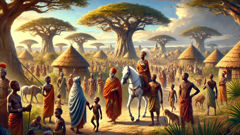Introduction
In the heart of the West African savanna, where endless golden grasses wave beneath the sky and baobab trees stand sentinel over the land, the legend of Yennenga is whispered on the wind and sung by griots beneath the stars. The story reaches back centuries, long before maps knew the borders of Burkina Faso, to a time when the earth was young, kingdoms were only beginning to rise, and destinies were shaped by courage and love. It is a tale cherished by the Mossi people, a story not just of conquest or royal lineage but of a fierce, visionary princess who defied the confines of her father's court and listened to the callings of her own heart. In her youth, Yennenga grew up within the sturdy walls of Gambaga, daughter to King Nedega, who ruled the Dagomba kingdom with wisdom and might. Unlike other princesses, Yennenga was never content to remain in the shadows. She was drawn to the clangor of swords, the rhythmic pounding of hooves, and the thrill of riding at full gallop across the plains. Trained by her father in the arts of war, she soon became renowned as a formidable horsewoman and archer, a leader beloved by her people and admired—even feared—by her enemies. Yet, for all her prowess, Yennenga’s heart longed for something more. She dreamed of a life outside the gilded cage of the palace, of a love that would match her courage and a destiny of her own making. It was this longing that would set her on an extraordinary path—one that would test her spirit, challenge her loyalty, and lead her to the founding of a people who would forever honor her name. The legend of Yennenga is not just a chronicle of kings and battles; it’s a celebration of resilience, the enduring power of love, and the ways a single act of bravery can change the course of history. Step into the story of Yennenga, where the echoes of hooves still thunder across the plains and a princess’s choice shapes the future of a nation.
The Daughter of Gambaga: Princess Among Warriors
From the day she first opened her eyes in the palace of Gambaga, Yennenga’s life was shaped by the cadence of power and tradition. Her mother, the queen, was gentle and wise, weaving stories and wisdom into Yennenga’s earliest days, while her father, King Nedega, ruled with strength and vision. Gambaga itself was a marvel: a city of rounded clay walls, bustling courtyards, and the constant hum of preparation for life in a kingdom surrounded by both allies and rivals.

But even as a child, Yennenga was restless. While other girls learned the secrets of weaving and cooking, she’d slip away from her mother’s side and watch the soldiers train in the courtyards. She marveled at their glinting shields and rhythmic drills, her eyes wide with admiration. Her father, observing her keen interest and unyielding spirit, decided not to stifle her. Instead, he invited her to join in the training, making her an apprentice among his warriors. It wasn’t long before Yennenga’s talent became apparent. She handled the bow with a deftness that belied her age. Her arrows flew straight and true, and her affinity with horses seemed almost mystical. The royal stables became her sanctuary, the great white stallion she called "Sikidigi" her constant companion. Together, they would thunder across the open fields, the wind tangling her long braids behind her as she laughed in pure exhilaration.
By the time she reached womanhood, Yennenga had earned the loyalty and admiration of her father’s warriors. She led them into battle against marauding raiders and rival tribes, her presence on the field a rallying force. Stories spread of the princess who fought like a lioness, her spear flashing in the sun, her voice carrying above the din of war. Yet for all her victories, something restless gnawed at Yennenga’s heart. In the evenings, after the fires in the palace courtyard had died to embers, she would wander the moonlit gardens. She watched the stars wheel overhead and wondered what life waited beyond Gambaga’s walls. Her father saw his daughter’s growing renown as both a blessing and a curse. He cherished her fiercely but also feared losing her. Offers of marriage came from far and wide, but Nedega turned them all away. He believed no suitor was worthy of his extraordinary child—and perhaps, deep down, he didn’t wish to part with the last light of his own youth. As months turned to years, Yennenga’s restlessness became sorrow. She loved her father and honored the traditions of her people, yet she yearned for freedom and for a destiny that she could claim as her own. Her eyes, once bright with pride, now sometimes shone with tears as she dreamed of a life outside the palace, of love, of adventure, of a place to belong.
It was in this shadowed space between love and longing that fate began to stir. The kingdom was at peace, but Yennenga’s spirit was not. One night, unable to sleep, she slipped into the stables and leaned against Sikidigi’s warm flank. She whispered her hopes and fears to the horse’s patient ears, unaware that her journey was about to take a turn that would echo through generations. The dawn after that sleepless night, she resolved to speak with her father. She pleaded with Nedega for permission to leave Gambaga, to seek her own path and perhaps find love outside the confines of the royal court. But Nedega, his heart caught between pride and possessiveness, refused. He ordered that Yennenga remain within the palace walls, assigning guards to keep her from slipping away.
The princess was heartbroken, but her spirit was not so easily cowed. She began to devise a plan, calling upon her closest confidantes among the warriors. These loyal friends agreed to help her, touched by her passion and longing for freedom. Together, they plotted an escape that would require both cunning and courage. On a moonless night, while the palace was cloaked in shadows and silence, Yennenga dressed herself in the armor of a common soldier. She slipped unnoticed from her chambers, leading Sikidigi through a secret passage known only to a handful of trusted allies. Her heart thundered with fear and anticipation as she mounted her horse and galloped into the darkness, leaving behind the only home she’d ever known.
Her escape was not without peril. The king’s guards, upon discovering her absence, sent riders in pursuit. But Yennenga knew the land as well as any, and Sikidigi’s powerful legs carried her swiftly through forests and across rivers, always keeping one step ahead. For days she rode, sustained by hope and determination, even as exhaustion pressed on her shoulders. With every mile, the world grew wider, and the promise of a new life shimmered on the horizon.
Love in Exile: Yennenga and Rialé
The wilds beyond Gambaga were both beautiful and unforgiving. Yennenga pressed onward, her mind swirling with uncertainty. At first, freedom tasted sweet. She crossed thick forests, their canopies alive with the calls of birds and the chatter of monkeys. She forded rivers where crocodiles slid beneath the surface, and traversed grasslands shimmering with the heat of midday sun. Sikidigi carried her tirelessly, the bond between horse and rider now deeper than ever. The world beyond the palace was full of wonder, but also shadows. Nights were cold and lonely; days brought both fatigue and the threat of pursuers. Though she kept a careful watch, Yennenga knew it was only a matter of time before she might be discovered by bandits or wild animals—or even her father’s soldiers.

It was after many days of journeying that disaster struck. One evening, as dusk fell and Yennenga sought shelter beneath a thicket of acacia trees, she was ambushed by a band of outlaws. Outnumbered and exhausted, she fought valiantly, but a lucky blow sent her tumbling from Sikidigi’s back. The world spun and faded to black. When she awoke, she was in a small hut, her wounds tended and bandaged with care. The first thing she saw was a pair of calm, intelligent eyes watching her from across the room. Her rescuer was Rialé, a solitary hunter who lived on the fringes of the forest. He explained that he had found her unconscious and defended her from the bandits, driving them off before bringing her to safety. Grateful but wary, Yennenga kept her true identity hidden at first. She introduced herself simply as a traveler fleeing injustice, seeking a place to belong. Rialé listened quietly and offered no judgment, only kindness.
Over the weeks that followed, Yennenga recovered her strength. Rialé taught her how to live off the land: how to set snares for rabbits, which wild roots could be eaten, how to read the shifting winds and tracks in the sand. In return, Yennenga shared stories of life in Gambaga—her childhood games among palace gardens, lessons with her mother, and her earliest days learning to ride and shoot. Something gentle began to grow between them: a mutual respect, then affection, then love. They spent evenings by the fire exchanging stories and laughter beneath the sweep of stars. With Rialé, Yennenga found both companionship and the freedom she had longed for all her life. Sikidigi remained ever at her side, but for the first time, she felt the peace of belonging—not to a place or a title, but to another heart.
Their happiness was simple and profound. Yet, even in their secluded forest clearing, Yennenga’s dreams lingered. She saw visions of a great kingdom rising from the earth—one where justice and kindness reigned, where men and women could live together in strength and harmony. These dreams kindled a hope that perhaps their love could build something lasting, something greater than themselves. Seasons changed. Yennenga and Rialé built a life together, tending a small field, sharing in the rhythm of sunrise and sunset. News from Gambaga was scarce, but Yennenga occasionally heard travelers speak of the king’s grief for his missing daughter and the unrest that followed her disappearance. She wondered if she would ever see her father again or if her future now truly belonged to these wild lands.
It was during one golden season that Yennenga bore a son. They named him Ouedraogo, meaning "stallion" in honor of Sikidigi—the faithful companion who had carried her from captivity to freedom. Ouedraogo was strong and spirited from birth, with his mother’s fire and his father’s calm resolve. As the boy grew, Yennenga told him stories of courage and love, planting in him the seeds of a new vision—a nation that could rise from their family’s union, uniting the scattered peoples of the plains.
In the quiet of their humble home, a great destiny was quietly taking shape. Yennenga, once a princess in exile, now stood at the heart of a new beginning—a mother, a lover, and the founder of a people whose legacy would endure long after her own story faded into legend.
The Founding of the Mossi: Destiny Realized
The seasons rolled gently over the savanna, and Ouedraogo thrived under the watchful eyes of his parents. As Yennenga and Rialé tended their small fields and watched their son’s first steps, word began to spread of a new family living on the edge of the forest—one led by a woman of unusual strength and wisdom. Nomads and villagers alike started to seek their counsel. Some came for advice on disputes or hunting, others for protection against marauders who still threatened the region. Yennenga greeted them all with patience and clarity, her reputation growing quietly but steadily.

With each visitor, the seeds of community took root. Disparate groups—once rivals—began to gather around Yennenga’s household. They saw in her the courage of a true leader, and in Rialé, a man who embodied calm and unity. Ouedraogo grew into a vigorous youth, inheriting both his mother’s fiery heart and his father’s steady wisdom. He trained with his mother in riding and archery, learning not just the arts of war but the importance of justice and compassion. As more people came to settle near their home, huts sprang up like shoots after the rain. The beginnings of a village appeared—fields tilled in neat rows, children’s laughter ringing out in the dusk. What started as a small refuge soon blossomed into a thriving settlement.
One evening, as the setting sun painted the sky in shades of orange and violet, a messenger arrived from Gambaga. He brought word from King Nedega—now older and wearied by years of regret—who had never ceased searching for his lost daughter. The messenger carried an olive branch and a plea: would Yennenga return, or at least allow her father to see the family she had built? Moved by memories and a longing to heal old wounds, Yennenga agreed. With Rialé and Ouedraogo at her side, she set out toward Gambaga. The journey was bittersweet. As they approached the familiar gates, memories of childhood flooded back: her mother’s gentle hand, her father’s stern but loving gaze, the clangor of the training fields. At last, father and daughter stood face to face beneath the baobab trees. Time had softened Nedega’s features, but when he embraced Yennenga and met his grandson Ouedraogo, the years melted away. There were tears and words that needed no translation—a family reunited, old sorrows forgiven.
King Nedega welcomed Rialé as a son and Ouedraogo as the heir to both lineages: royal blood and humble strength entwined. Together, they returned to the village Yennenga had founded. Nedega marveled at the unity she had brought to once-warring peoples. He saw how Ouedraogo’s leadership inspired loyalty and hope. With his blessing, the settlement grew into a kingdom. Under Ouedraogo’s guidance, the Mossi people united disparate tribes into a single nation that valued justice, courage, and harmony above all. The Mossi kingdom flourished—villages rose from the earth, trade routes expanded, and traditions were woven together to create a tapestry both ancient and new.
Yennenga lived to see her dream fulfilled: a people born from her longing for freedom and love. Though she was revered as a queen, she never forgot her humble beginnings or the wild courage that had carried her across the savanna. Her story became legend, passed down from griot to griot, sung in moonlit gatherings and painted on clay walls. In time, statues of Yennenga astride Sikidigi graced village squares across the land. Her name became a rallying cry for generations—an emblem of hope, resilience, and the power of forging one’s own destiny.
Conclusion
The legend of Yennenga endures not only in the annals of the Mossi people but in the spirit of all who value courage, freedom, and love that transcends boundaries. Her journey from a restless princess to a visionary founder reminds us that greatness often begins with a single act of defiance—a refusal to accept the limits placed upon us by tradition or fear. Through hardship, loss, and the wild unpredictability of fate, Yennenga never relinquished her dreams. She sought not only her own destiny but a new way of living for everyone who would follow in her footsteps. Her legacy is etched into the landscape of Burkina Faso: in the proud gait of horses across the plains, in the strength of Mossi families, and in the voices of storytellers who keep her memory alive. The kingdom she helped found remains a testament to unity built through compassion and respect. Long after her own life faded into myth, Yennenga’s story continues to inspire those who seek to shape their own future—not through conquest or oppression, but through vision, resilience, and a heart unafraid to love. In every Mossi child’s dreams, in every song that rises with the wind, Yennenga’s courage rides on.













